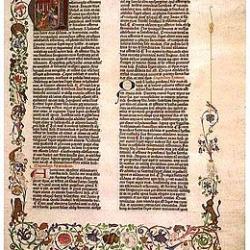“You’re doing what?” Yes, I’m handwriting the New Testament. That’s 260 chapters, 7,957 verses from the NIV.
Looking at Matthew 2 that I completed this week, two interesting observations stand out. First, Matthew really likes to makes connections with Jewish prophecy. He makes three such comments in this chapter. The first two come from Micah and Jeremiah. The third, about Jesus being called a Nazarene, is just confusing.
It is not from a direct quotatio n from the Old Testament, but because its from “the prophets” the idea is that Jesus being a Nazarene/Nazarite was foretold in the Messianic prophecies of old. If Matthew lived today, I have a feeling he would be a big fan of the Left Behind series or Joel Rosenberg’s novels.
n from the Old Testament, but because its from “the prophets” the idea is that Jesus being a Nazarene/Nazarite was foretold in the Messianic prophecies of old. If Matthew lived today, I have a feeling he would be a big fan of the Left Behind series or Joel Rosenberg’s novels.
But the second thing Matthew brings attention to is the historicity of Jesus. People do not usually make up stories and add specific details about who was the king at the time or Jesus and his family living in Egypt until the government’s leadership changed. All of these notes along the way help affirm what those in the First Century assumed–Jesus was a real person who lived in literal space-time. He was not a myth or a mist. He was a man. And he was Messiah (Matthew is very clear on this last point.).
Many spiritual traditions in our world stem from some mystical experience or legendary folklore with little connection to historical reality. In contrast, Christianity is clearly based on a person who lived in a particular time, place, and culture. Before Jesus, Christianity did not exist. By 65 (just over 30 years after Jesus lived on earth), his followers were being blamed for burning down the capital of Rome. Churches spread across the entire Mediterranean. Something happened during those years. That something, according to Matthew, is that the Messiah showed up.
If Matthew is right (and I think he is), Jesus should shatter how we look at life and live life. He gives us a purpose for living and the perspective of eternal life. That is why the most important question a person could ever consider and answer is: “Who is Jesus?” Matthew is all about providing answers about this Jesus he lived among so many years ago.
+++
Dillon Burroughs has written, co-written, or edited over 60 books, including the upcoming devotional work Thirst No More (October 2011). He served as an associate editor for The Apologetics Study Bible for Students and is a graduate of Dallas Theological Seminary. Find out more at DillonBurroughs.org.











